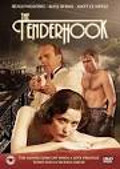
Directed by
Jonathan Ogilvie
96 minutes
Rated M
Reviewed by
Sharon Hurst

The Tender Hook
Synopsis: Iris (Rose Byrne) is the elegant lady friend of Mac (Hugo Weaving), a “businessman” of dubious repute, who organises boxing fights, owns a gym and is high up in the Sydney underworld of the 1920s. Alby (Matt Le Nevez) is recruited into Mac’s stable of fighters as a sparring partner for Aboriginal boxer Alby (Luke Carroll). There is an attraction between Iris and the newcomer, and when Art is humiliated by Mac, more than punches fly.Jonathan Ogilvie has an impressive resumé of short films but perhaps he should have stuck to the short format instead of giving us this somewhat mongrelised version of a noir-style film, set in the 1920s, but with an attempt at a modern sensibility. In his own words: “My aim for this film was a look and feel that matched the contradictory implications of the title. A suggestion of both brutality and gentleness via a cinematically sharp but historically blurred approach to the period.” It all smacks a bit of pretentiousness and that is indeed my assessment of this well-meaning but ultimately disappointing film.
Hugo Weaving is excellent in the role of Mac, an Englishman who sports a suave exterior, but is underneath a vicious and nasty piece of work, doing his own stand-over work with a razor in hand (Be warned, there are a couple of very brutal scenes!). As part of the “historical blurring”, Ogilvie has Mac sing a few numbers out front of a 20s big band which plays in Mac’s nightclub. He sings Leonard Cohen’s 'I’m your Man' and Dylan’s 'Ballad Of A Thin Man', both surprisingly well executed by Weaving. Luke Carroll is also impressive as Alby, the talented but unfortunate indigenous boxer who gets jeered and abused because of his colour.
The film looks slick with a lovely sepia/noirish cast to the shots, elegant costumes, and the requisite number of cars of the era. We also get a strong sense of the underworld, apparently very big in Sydney at the time, but no real sense that there is anything distinctively Australian about it (no sign of Squizzy Taylor here!). But since all is set up so well period-wise, why bother to then insert real footage from the time and superimpose the actors over it? It just seems gratuitous.Adding to the frustration, in parts the plot is convoluted and hard to follow: there is a scam involving the re-labelling of beer, but for the life of me I couldn’t make head or tale of it; similarly, the later scam involving Art’s fighting under someone else’s name is simply too unclear in its scripting.
The lesser characters of Ronnie and Donnie, two of Mac’s henchmen, are also somewhat blurry – they are used as indicators of the political sensibilities of the time, one being a staunch communist and the other a monarchist - another example of trying to cram too much into the plot or trying too hard to emulate an American gangster movie.
The usually talented Byrnelooks fabulous, but doesn’t have enough depth of character to get her teeth into, and seems to rely on a monotonal facial expression set somewhere between boredom and distress. Le Nevez doesn’t really impress and the chemistry between him and Byrne is even less convincing. Pia Miranda (so fine in Looking for Alibrandi) also failed to convince as Daisy, a society hanger-on in Mac’s scene.
Douglas Crombie made great mileage from the 1920’s with Caddie (1976) and there must be room for more films in Australian cinema that deal with this fascinating era, but The Tender Hook doesn't hit the mark.
Want something different?





